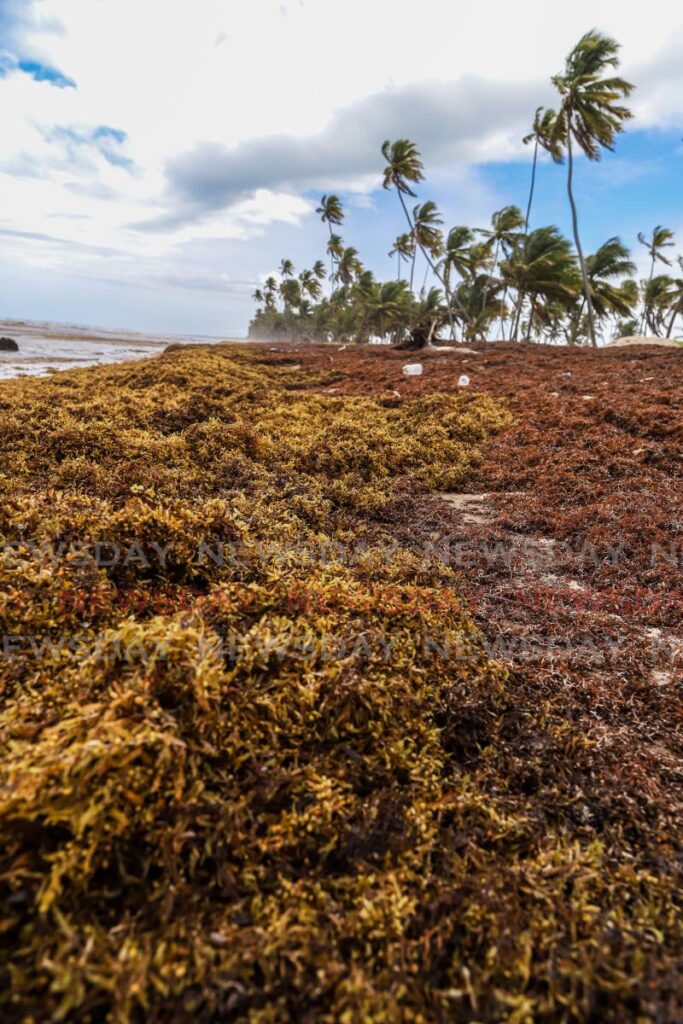UN to help rural women cope with climate change

Sargassum seaweed is presenting difficulties for entrepreneurs in the fishing industry. In the past five years, climate change has brought an influx of the seaweed to the region.
At a webinar hosted by UN Trinidad and Tobago on March 9, fisherwoman and former chair of the Women in Fishing Association Bernadette Fonrose of Guayaguayare said sargassum has been gravely affecting her business.
Fonrose explained, "Usually at this time of the year I have two deep freezes filled with bonito. However, this year, what's in my freezer can only be described as a horrific sight."
She said in the past year alone, 14 fisherfolk had lost their nets because of the amount of sargassum in prime fishing areas in Guayaguayare.
"Instead of catching fish, we are catching sargassum."
Ninety per cent of her income has been lost, she said, leaving her unable to pay her bills.
As a result of the smaller catches, she said, "The scarcity and stiff competition forces me to raise my prices.
"There are more days of seaweed than fishable days."
Fonrose said she also had to raise the price of smoked bonito last year, which resulted in complaints from her customers. This left her only able to raise the price by 20 per cent in some instances
Though she tries to absorb the higher costs and keep raw-material costs at a minimum, she hopes for more foreigners who are able to pay the price she wants to charge, as "there is nothing in place agriculturally for the fishing community."
UN Development Programme (UNDP) assistant representative Sharifa Ali-Abdulah said climate change particularly affects the Caribbean as warmer temperatures cause higher sea levels. On the removal of sargassum, she said funding is available to the region from the Government of Japan.
"Half of Caribbean people live along coastal shorelands," she pointed out. "Climate change also has an impact on land, because of forest fires."
She said the UNDP has accessed funds to help countries to meet climate challenges by partnering with organisations like the European Union.
On meeting the needs of the most vulnerable, Ali-Abdulah said, "There are markers that the UNDP uses as performance indicators."
Ali-Abdulah also said, "The UNDP is pleased to establish the country's first plastic up-cycling centre for women in Manzanilla," and mentioned women beekeepers in Brasso Seco as a similar group of rural women in need of agricultural insurance.
UN Women's Multi Cultural Office (MCO) Caribbean representative Tonni Brodber said Caricom and UWI are doing research into the removal and repurposing of sargassum.
On losses caused by climate change, Brodber added, "The UN is working with governments to figure out how we ensure the understanding of risk. Many women are not in a position to access or afford insurance to replace nets and other agricultural needs for their crops. Often women work in service positions which cannot accommodate for insurance for losses."
Mariam Aertker, the UN High Commission for Refugees' (UNHCR) head of its TT office, said, "Climate change amplifies numerous difficulties. The UNHCR sees the gaps and tries to fill them."
The UNHCR also works with a spectrum of agencies to create funding, programmes and support.
Aertker highlighted the waste of resources that refugees and migrants bring with them.
"Refugees and migrants bring in resources that should be incorporated for resilience. They should be included in programmes of leadership and economic empowerment."
Sasha Jattansingh, national and finance adviser to Antigua and Barbuda with the Commonwealth Secretariat, said it is important to incorporate gender equality in climate action.
Jattansingh explained, "Finance is always the elephant in the room. Men and women can equally benefit from mitigation and adaptation funds.We cannot exclude aspects of a woman's life while making robust policies."

Comments
"UN to help rural women cope with climate change"